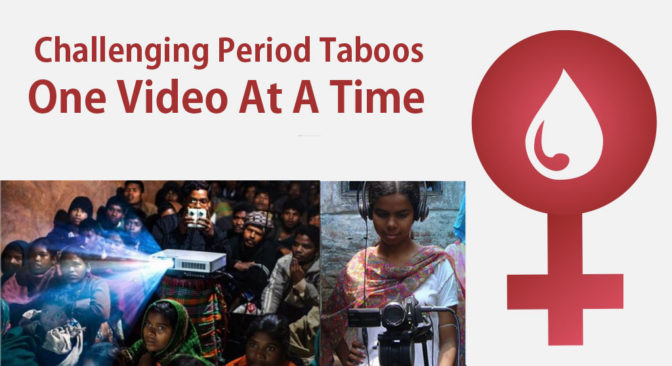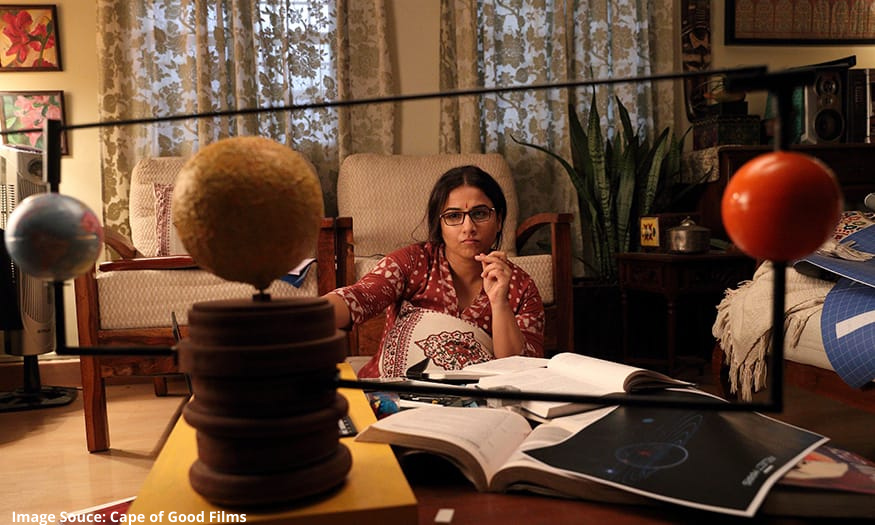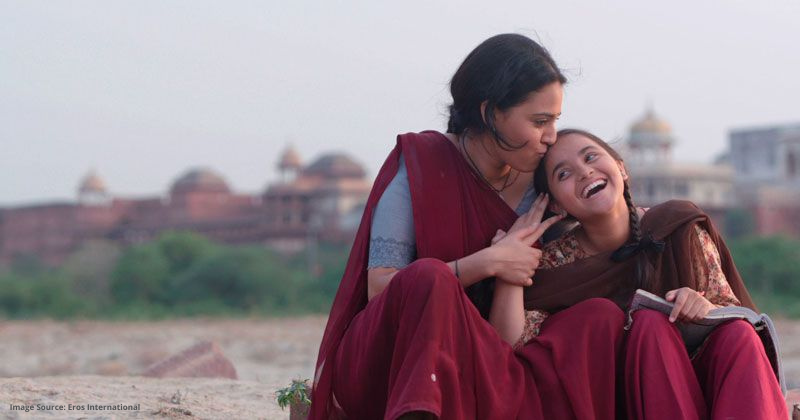The challenge with menstruation being a taboo is that the subject is hidden so much that the scale of the problems could not be measured and hence difficult to address at all levels. Video Volunteers want to change this by documenting various aspects of menstruation and conversation by a series of videos. We spoke to Sangeeta Rane from Video Volunteer team about this project.
These videos are a part of Video Volunteers gender campaign #KhelBadal – Dismantle Patriarchy. The campaign is taking on patriarchy through stories of women and men who face, negotiate and challenge patriarchy in everyday life — at home, at work, at school, in cultural and public spaces. Know more here.
Period: That which must not be named
Daksha’s first period was a happy one –a small ceremony with special offerings was done at the temple, at home, she was given sweets to eat and was told to rest. “At the time, I thought I might have done something good, having my periods!” recalls Daksha. But from the second period onwards, Daksha was doubtful that her periods were a good thing. She was treated as an outcaste, was refused a comfortable place to sit or sleep. More restrictions were soon enforced upon the girl to act like a girl, “I remember, I was once scolded for a small thing like laughing loudly,” she says.
There is a rising rhetoric across Urban India to challenge the deeply misogynistic and sexist taboos that continue to surround menstruation. Women have thronged metro cities such as Delhi, Bangalore and Mumbai in rallies, college students have posted messages on sanitary napkins and some of the age-old barriers against women in religious places have been shattered. These are indeed revolutionary steps taking towards achieving stigma-free equality for women.
But behind closed doors of their own homes, women and girls are often considered impure, contaminated, and dirty when they menstruate. Period-shaming is the gateway to the extreme forms of discrimination that millions of girls have experienced, and continue to experience across India. Make no mistake–this is not limited to any one class or community. Girls face exclusion, segregation, restrictions on movements and diet. Even to this day the stigma persists–we get sanitary products wrapped in newspapers or hidden in black plastic bags, advertisements feature blue liquids to represent blood and are women are expected to use all sorts of code words instead of ‘period’.
These restrictions perpetuate the culture of silence and feed shame and stigma, hampering the freedom of women. After all, it’s a natural bodily process. Why can we not be more matter of fact about it?
Periods, Patriarchy and Priesthood
Over the years, women have been breaking stereotypes and occupying male-dominated bastions with great aplomb. Yet, religion remains the one arena worldwide, that has denied women an equal footing with their male counterparts.
When Video Volunteers set out to find out what men and women thought about women conducting rituals in temples, the answer was a vehement no. Men and women alike linked it to menstruation – that it makes women “impure” 4-8 days a month.
From Sabarimala to Haji Ali to Shani Shingnapur, various religious institutions have held the belief that menstruation makes women’s bodies impure and denied women entry to religious institutions in entirety. The judiciary has time again struck down such restrictions placed upon women’s entry on the grounds that it violates their constitutional right to equality and in the Sabarimala case asked one crucial question – Is spirituality the exclusive domain of men? In that case, why can’t women be conducting religious ceremonies?
Silence, Shame and Stigma around Menstruation
The first period can be scary and confusing. But coupled with deep-seated taboos around menstrual impurity, it can become a harrowing experience. Four women of different ages from rural Uttar Pradesh share their experiences of menstruation and the stigma. These experiences surprisingly are very similar to the ones shared by the women of urban India too. “After my first period, all my grandmother said was ‘You are a woman from today onwards. During your days, your body is impure.’ I was scared that I was down with some cancer.” says Sangeeta Rane, VV’s Communication coordinator.
What is interesting is that all of them seem to have internalised these period myths to a greater or lesser degree. They have unquestioningly accepted that they can’t be part of auspicious religious rites or cook. Studies show that nearly 82% of Indian girls are not aware about menstruation till they reach menarche. For most, the source of information comes from their mothers. The age old superstitions about period thus continue unchallenged. This is especially significant as the present government has raised objection to the existing sex education curriculum for schools. 10% girls in India even believe that menstruation is actually a disease! 23% school going girls drop out once they start menstruating.
There is an urgent need to bring conversations about menstruation with all its associated silence, stigma and myths out in the open. Join us as we take on menstrual myths and stigma in our Twitter chat on December 20 between 1 and 2 pm. Together we will dismantle taboos around menstruation, to free women from the society’s cultural confinement.
Challenging a 400-year-old custom that denied women temple entry
From Hinduism to Judaism to Christianity to Islam, religious restrictions surrounding menstruation and the belief that it makes women’s bodies impure are common across the board. While the judiciary has upheld women’s right to equality in cases of Shani Shingnapur, Haji Ali and Sabarimala, where women were denied entry to religious sites, the practice continues across the country.
When community correspondent Rohini Pawar found out that women in Veer village in Maharashtra too were denied entry to the inner sanctum of the temple, she decided to redress this wrong. Although Rohini is an atheist, as a fierce advocate of women’s right, she found this deeply problematic – denying women the right to enter any space is a violation of their right to equality. She took up the matter, first, of the community first and then the temple authorities.
When she spoke to the women in her community she realised that women have never protested this practice, due to the fear of backlash for violating traditional practices. She screened her video talking about the issue to the community as well as local NGOs, who petitioned the temple authorities. And, with this, a 300-year-old custom was not just challenged but also changed – women are now allowed to enter the inner sanctum of the temple in Veer Village.
 Sangeeta Rane,
Sangeeta Rane,
Program Coordinator – Communications at Video Volunteers.
These videos are a part of Video Volunteers gender campaign #KhelBadal – Dismantle Patriarchy. The campaign is taking on patriarchy through stories of women and men who face, negotiate and challenge patriarchy in everyday life — at home, at work, at school, in cultural and public spaces. Know more here.








